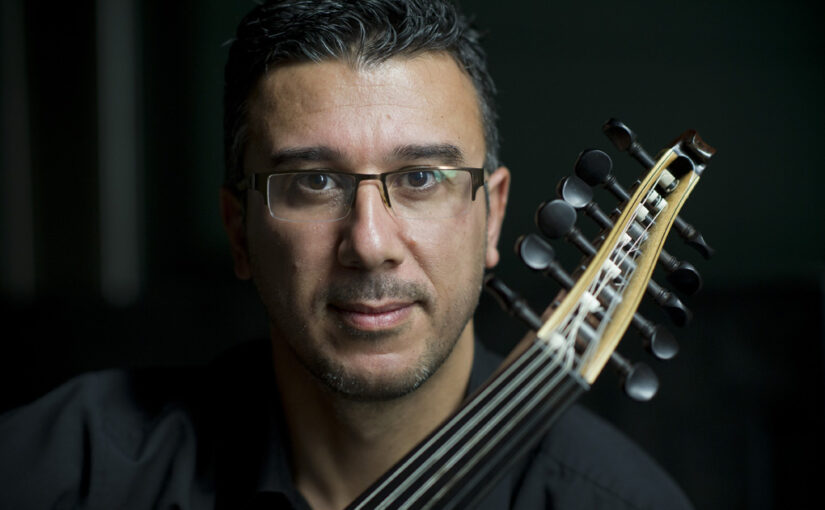OUD
2 au 6 janvier 2025
COURS DISPENSÉS EN ANGLAIS
OBJECTIFS
- Développer ses performances par l’analyse des notions théoriques et pratiques
- Améliorer sa connaissance musicale et sa technique instrumentale
- Acquérir les outils (modes en tétracordes) pour développer les techniques d’improvisations
- Explorer les différents modes d’interprétations
- Développer sa capacité d’analyse et d’écoute
- Elargir sa pratique de la musique classique arabe par les différents modes de jeux
CONTENU PÉDAGOGIQUE
Les méthodes pédagogiques : Au-delà, de l’enseignement dit « traditionnel », le programme sera constitué autour d’une nouvelle approche qui permettra d’élargir les différents modes d’interprétations basés sur l’utilisation rythmique du plectre (dispositif permettant de pincer ou gratter les cordes du luth arabe – oud).
HORAIRES : 10h00 – 13h00 // 14h00 – 16h00
NOM DES ŒUVRES MUSICALES
CONDITIONS DE PARTICIPATION
Chaque participant viendra avec ses propre instrument, repose-pied, pupitre, accessoires, partitions imprimées. Avoir un niveau minimum d’anglais.
INSCRIVEZ-VOUS SANS PLUS TARDER
• Date limite de demande de prise en charge : 02/12/2024 •
>> INSCRIPTION EN LIGNE <<
>> TARIFS ET MODALITÉS D’INSCRIPTION <<
>> VOS POSSIBILITÉS DE PRISE EN CHARGE <<
BIOGRAPHIE
Parce qu’il est considéré dans le monde arabe comme un continuateur des grands virtuoses du luth arabe, le oud, la modestie pleine de dignité d’Ahmad Al Khatib impressionne. Fils de poète, sa quête musicale, au service de l’émotion de l’auditeur, montre la grave noblesse d’une impérative quête de sens.
Né en 1974 dans un camp de réfugiés palestiniens en Jordanie, il apprend le oud très jeune puis étudie la musicologie et le violoncelle occidental classique à l’université Al-Yarmuk (Jordanie), recevant en 1990 et 1991 un 1er prix de Compétition pour musiciens en solo. Diplômé avec mention en 1997, il s’installe à Ramallah (Palestine) et rejoint le Conservatoire National Edward Saïd de Jérusalem-Est, dont il dirigera le département de musique orientale. Il lance l’ensemble de musique actuelle palestinienne Karlama, auquel participe Youssef Hbeisch.
Avril 2002 : Ramallah vit en état de siège. Pendant le couvre-feu, Ahmad compose. La même année, son visa ne lui permettant plus de vivre en Palestine, il continue à travailler pour le Conservatoire à distance. Puis s’installe en Suède ou il étudie l’ethnomusicologie et la méthodologie de l’Education musicale à l’Université de Göteborg.
En 2004 parait Sada (Résonance), premier CD en solo, qui outre des compositions personnelles rend Hommage à Jamil et Mounir Bashir.
Remarquable pédagogue, Ahmad a publié 5 ouvrages novateurs d’enseignement du oud et 5 autres de transcription musicale pour les compositeurs arabes modernes, devenus des références pour l’enseignement. Il enseigne aujourd’hui les théories de la musique modale, de la composition, et de la Musique d’ensemble, à l’université de Göteborg.
Il s’est maintes fois produit en solo, en duo ou au sein d’ensembles variés : Al-Yarmouk Musical Quartet (Jordanie), l’Oriental Music Ensemble (Palestine), Salam ou le trio Samara (Suède), avec lesquels il explore les points de rencontre possibles entre musique orientale, jazz et folklore scandinave. Il continue en parallèle à composer pour Karlama qui sortira plusieurs albums. En 2011, il créé avec le percussionniste Youssef Hbeisch, le Duo Sabîl (‘en route’) qui produira un premier album sous le label de l’Institut du Monde Arabe (IMA). Leur 2ème album paraît en 2012, merveille remarquée d’expressivité et de profondeur, fruit de la rencontre avec le quatuor à cordes Béla. Le troisième album, Zabad apparaît en 2017 comme une respiration dans la production musicale du duo sous le label Harmonia Mundi.
Les Festivals internationaux et tournées ont conduit Ahmad au Liban, en Turquie, Tunisie, Egypte, Jordanie (Oud Days d’Amman), Palestine (Jérusalem Music Festival), Maroc (Festival International d’Oud de Tétouan), Etats-Unis (Arabesque du John F. Kennedy Center), Brésil (Mercato Cultural de Bahia), Estonie (International Early Music Festival de Tartu), France (Paris Jazz Festival – Auditorium du Louvre), Londres (Shakespeare Globe) etc…
Enseignement :
– Université de Göteborg – Académie de Musique & Art Dramatique – 2004 à aujourd’hui
– Université de Yarmouck – Education musicale – 1993 à 1997
– Conservatoire National de Musique Edward Saïd – Responsable du Département musical – 1998 à 2015
Publications :
– Les compositeurs contemporains : La musique instrumentale arabe (5 Ouvrages)
-La musique arabe: Enseigner la musique traditionnelle dans les institutions actuelles.
– Sharqiyat, Anthologie de compositions de musique orientale (5 ouvrages)
Récompenses :
– Premier Prix Catégorie Soliste, Concours d’Amman en Jordanie – 1990 et 1991.
– Prix Planeta, Inspirateur de l’Année, Göteborg en Suède – 2003
– Aga Khan Music Awards, en reconnaissance d’une haute carrière artistique – Finaliste 2019
Extraits vidéo
